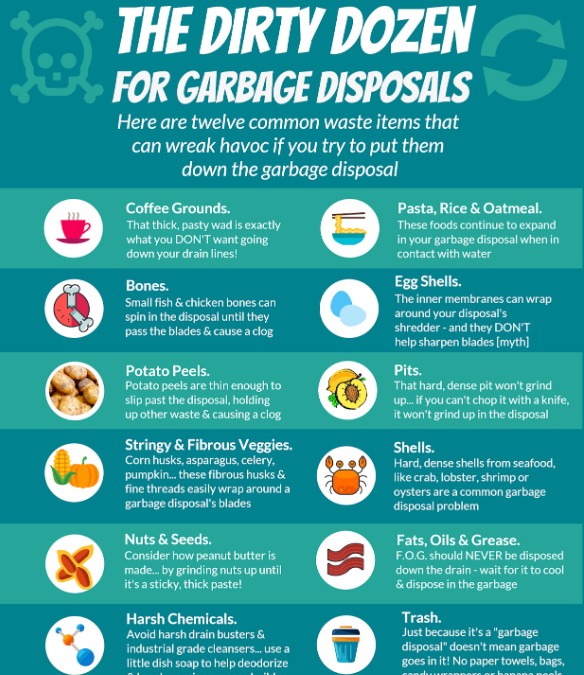You can also learn why you run water while running your garbage disposal. But what can you put down on your garbage disposal? And how can you keep food scraps from clogging it? Continue reading for helpful tips. Here are some of the most common garbage disposal clog-causing items.
What items cannot go down a garbage disposal?
There are many things you should avoid putting down on your garbage disposal. The first rule of thumb is to avoid throwing things down the drain that aren’t organic. These include celery, carrots, artichokes, and rhubarb. These items are best poured into zip-lock bags or compost piles. The list of prohibited items is long, but there are some common ones you shouldn’t put at your disposal.
Besides bones and shells, other items you should avoid putting down on garbage disposal include hard, fibrous vegetables. These are difficult to grind and can cause a clog. Even softer nuts should be avoided if possible. Think of your garbage disposal as a nut grinder – putting peanuts down produces peanut butter. However, the sticky residue that results can easily clog your drain.
Another food item you should avoid is citrus rinds. The citrus rinds acids can clean your disposal and remove any stuck-on grease. Lemon chunks mixed with vinegar are also effective for removing the odor at your disposal. Eggshells should not go down the garbage disposal as they can blunt the blades and contribute to clogs. To avoid this, you can also buy a garbage disposal that can spit out coffee rinds.
Does ice in the garbage disposal work?
Ice can clean your disposal and sharpen the blades. Ice can also scrub tough areas inside the disposal. This can help remove dirt, grease, and other residues without using hot water, which could send oil down the drain and clog the garbage disposal. And ice also prevents the drain from becoming backed up.
Some plumbing experts recommend using ice in the garbage disposal. This works by dislodging fatty deposits in the disposal system, which helps clean the pipes. However, it’s important to remember that the ice does not break down garbage; it is the hot water that breaks down the debris. Adding ice to the disposal does not guarantee clean disposal and may also contribute to odors.
Garbage disposals are notoriously smelly, so putting ice in them can be a good way to freshen the air. But, if ice isn’t effective, other options include vinegar or baking soda. These options will clean your disposal and eliminate odor-causing bacteria. Baking soda will also deodorize grease and gunk in your garbage disposal. So, the bottom line is that ice will not sharpen the garbage disposal blades.
Why do you run water when using the garbage disposal?
Running water during your garbage disposal cycle can prevent the disposal from clogging. While it may be tempting to pour grease and other items down the drain, they are more likely to get stuck in the pipes. Even worse, they can clog the entire drain. Water is necessary to clear the disposal and prevent overflow. However, it would be best to use it properly to avoid this problem.
Firstly, running water helps the disposal flush the ground-up residue out of the trap and down the waste pipe. Running water is like taking a vitamin: it helps the disposal grind up food particles and push them out. Moreover, it cools the arms of the disposal and balances the weight of the garbage in the cavity. Running water during garbage disposal helps the device function better and lasts longer.
Second, running cold water during your garbage disposal cycle helps to remove grease and fat. Hot water may liquefy these substances and clog your drain. When you run cold water, you can flush food particles down the drain line while keeping the fat drippings in solid form. Try one of these quick fixes if your garbage disposal is clogged up. If none of them work, call a professional to come out and repair it.
Can you put food waste down at the garbage disposal?
You can put food waste down the garbage disposal if the waste is soft and liquid-based. Soups and other liquid-based foods are fine to put down in the garbage disposal. Foods that are non-drain-killing, such as fat, should be sliced or chopped into small bites. Likewise, avoid putting bones, skin, and other non-food-drain-killing items down the garbage disposal.
The best way to prevent food scrap from clogging your garbage disposal is to avoid flushing large amounts of waste down at once. Feeding the garbage disposal with cold water helps food scrap run down the drainpipes. Try not to put any expandable foods down the garbage disposal, such as bones and eggshells, as these can cause clogs in the pipes and garbage disposal.
Some types of food scrap are safe for garbage disposal, including cooked meat scraps. Just break up any large chunks beforehand, so they don’t clog the disposal. Generally, vegetables can be run through a garbage disposal, but you should not put fruit pits and large bones down. As for shrimp shells, you should keep these out of the disposal to prevent smelly odors.
Can you put coffee grounds down as garbage disposals?
Putting coffee grounds in your garbage disposal can be a disaster. Not only will coffee grounds clog up the disposal, but they will also make the sink smell bad. If you’re unsure whether coffee grounds will clog your disposal, add some lemon rinds or vinegar. The vinegar or lemon will help eliminate the smell and clean your sink and disposal.
Most people dump coffee grounds in the garbage. They think it will get rid of odors and be convenient. That’s partially true. The coffee ground can damage your disposal and plumbing, causing overflows and backed-up drains. Additionally, the grounds can damage the blades of your disposal, making them less effective. They also clog the pipes, which could cost you a lot of money in repair.
If you’re worried about the smell of coffee grounds in your garbage disposal, don’t. Coffee grounds can cause a significant buildup in your pipes. If this buildup becomes too large, the coffee ground can cause damage to your drainage system. Luckily, there are several ways to get rid of coffee grounds. Make sure to rinse thoroughly after using coffee grounds in your garbage disposal, and you’ll have no more odor-filled kitchen sink.
Do you need to clean the garbage disposal?
Cleaning the garbage disposal is one of the easiest tasks in the kitchen. You can clean your garbage disposal using basic household ingredients in just 20 minutes. After combining the ingredients, leave the mixture for 20 minutes to let the chemicals work. Repeat this process as often as necessary until the disposal smells pleasant. Remember to rinse and dry the disposal after use. To avoid clogged garbage disposal, clean it regularly.
Besides causing an unpleasant odor, a dirty garbage disposal can lead to serious health problems. It can contaminate surfaces and become a health hazard if not cleaned regularly. Regular cleaning of the disposal will prevent bacteria buildup and keep it working efficiently. So, you should add cleaning the disposal to your calendar to avoid unpleasant surprises.
Should you put eggshells in the garbage disposal?
In many households, eggs are a staple food. They are cooked in several ways, but we rarely consider eggshells. We chuck them in the garbage or throw them in the sink. After all, we’re so focused on not burning the egg that we forget about the shells. But are eggshells safe for disposal? Many plumbing professionals recommend that you avoid tossing eggshells down the garbage disposal. Eggshells contain calcium carbonate, which is great for sharpening blades in the garbage disposal, but it clogs the pipes if it gets wet.
While eggshells don’t damage garbage disposal blades, they can clog drain pipes and the sink. While they are unlikely to harm the disposal, they can cause a clog and a sluggish drain, resulting in a costly repair bill. It is best to put eggshells in the garbage can or compost bin to avoid this problem.
How often should garbage disposal be cleaned?
The answer depends on how often you use it and how much food waste you produce. If you only throw food scrap into the garbage once a week, cleaning your garbage disposal may only need to happen every few months. However, cleaning it more frequently is necessary if you put a lot of food scrap in your garbage.
Weekly cleaning can help your garbage disposal remain fresh and odor-free. Before cleaning your garbage disposal, please turn off the power and ensure no one is near it while you clean. It would help if you located the breaker in your home’s service panel under your sink. A cleaning sponge moistened with dish soap can scrub the disposal’s baffle. Rinse it regularly to remove any leftover gunk.
Cleaning garbage disposal is more involved than simply wiping out a sink. Before you attempt this task, be sure to check the switch located under the sink. Make sure no large objects are clogging it. You should avoid sticking your hands down the disposal, but if you think there are, use a flashlight to look inside. If you find any, you can use tongs to retrieve them.
Conclusion
A lot of things are not allowed in the garbage disposal. Some of these are paper towels, potato peels, seafood shells, corn husks, banana peels, onion skins, fruit peels, animal bones, and other starchy vegetables. You can throw these in the trash can to avoid clogged drains and garbage disposal issues. This is also one of the things you can do to take good care of your disposal’s blades and avoid major plumbing problems.



